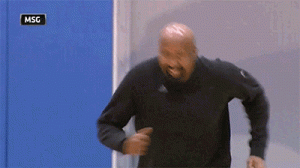In the past, I would have typed and typed and filled up a half dozen pages worth of text. I'm too old for that now. I also want to avoid any adversarial discussion with you since I respect you a great deal.
I am just very sad that you doubt my commitment to justice: economic, social, racial and gender justice. Your arguments are sound but this exchange still feels like a gut punch.
BTW, I would not have shown the same amount of patience that you showed when faced with a series of problematic posts that talked about a "culture of poverty." You're a better and more patient man than me.
There's a distinction to be made between who you were at 20 and who you are today. The same could be said of almost all of us, though likely not to the same extent.
Indeed, the reason your name is invoked in these sorts of situations is precisely
because you've changed. Not only that, but you're the best example of that change I can think of in our community's now 18 year history.
For the sake of fairness, it's arguably better to give users enough rope to hang themselves than to ban them for what we assume they think, or for what they're likely to do. Unfortunately, that means waiting until they attempt to cause harm. When they don't cross that line, they can still be irritants, if not antagonists, and the fear is that, in aggregate, they poison the well.
For better or worse, you've been the best example of why patience and understanding can pay off.
That's an insult to Rexanglorum circa 2009, but it's a compliment to you today. You've come a long way.
Where I have disagreed with 2017 Rex, in regards to today's posts, is with your assessment of who you were back then and the self-serving distinction you've created ("real racists" vs. those who merely served as apologists for racial inequality via cultural, rather than biological, explanations). I also believe we should prioritize the central issue: trying to make everyone feel safe, welcome, and respected on our forums. I've tried to put this ahead of my own "hurt feelings" over criticism of our staff's responses to racism - as that task is of paramount importance. Effect matters infinitely more than intentions.
However limited by circumstance, we all have some degree of freedom and choice in how we conduct ourselves. We do not, however, have the luxury of deciding how others are permitted to interpret our actions.
If you stand on my foot, you don't get to decide whether or not my pain is legitimate or worthy of consideration, merely because you didn't
intend any harm. Moreover, if you cease standing on my foot, I'm not obligated to forget about it. I'd be wise not to.
Nawghtyhare explained this well.
i mean
just cause a person changed for the better
doesn't mean
that everyone that had interaction with said person
has to forget the things they did
i may be wrong
but is that why u feel like its a gut punch
that since u changed
its "all good"
as a bystander to u and meths discussion with each other
im curious on why u feel like that???
i mean sometimes the truth about a person or their past can hurt
but many folks have said
u have done a complete 180
History is filled with examples of those who've reformed in some way or another. I know you're familiar with Hugo Black, for example. He went from joining the KKK to ruling in favor of the plaintiff in
Brown v. Board. That certainly qualifies as progress - though that progress was, itself, qualified by his opinion in
Korematsu v. United States.
As Dr. Bryan Stevenson of the Equal Justice Initiative often reminds us, we're all more than the worst thing we've ever done.
I don't like the idea of throwing people away. I tried my best not to give up on you as a human being during your time here, difficult as that was. When you resurfaced some years back, with a dramatically different and, from my perspective, better informed outlook, I found it inspiring.
John Newton, Hugo Black, and the subjects of other "redemption" stories aren't inspiring because they become peerless paragons of virtue - but because they demonstrate the human capacity for change.
I can understand why you'd want to distance yourself from and sanitize your past behavior, but you're a more effective advocate
because of your past. You're a bridge to all the other 200X Rexanglora out there.
As a result, you can reach a lot of people that others can't, and help them take a positive step forward in their own journeys.
Here's my challenge with this:
While you're a great example of what can happen when we don't throw people away, and sort of a "best case scenario" for demonstrating patience for those who promote what might be called (kindly or harshly, depending on your perspective) "diet racism", it's a hard trade to make.
If we'd banned you outright, you'd still have read Tim Wise et al. You'd still have managed to become better educated on social justice issues.
How many people were hurt by what you posted in the interim? How many may have left the community entirely because of Rex & TBone & blco & ryanjumpman & so on?
That isn't undone because you changed. It happened. And I have to accept that we
allowed it to happen, because we drew the line at
overt racism.
I'm a believer in well-facilitated dialog. I've seen it work in a variety of settings, and it's long been my hope that it could work here, with the unique opportunity we have to connect people.
But it is not and should not be every person of color's job to "save" or educate racists.
For many people, NikeTalk is a hangout spot. It's a place to relax, be yourself, and enjoy the company of like-minded others from around the world.
If I'm exercising every ounce of self-restraint I have to refrain from kicking Tucker Carlson in the head, I'm not enjoying myself - and I'm certainly not relaxing.
There's a real human cost there, and it's such a hard balance to strike that I truly do empathize with those who would rather we just toss people out the moment they give us cause to suspect that they are in some way prejudiced. Goodness knows we deserve a break from bigotry, and we all know it's not Twitter.
Yet I keep coming back to the possibility that our community can, in some small way, be a force for good and can improve people's lives in ways beyond entertainment.
The right thing is often the hardest thing to do.









